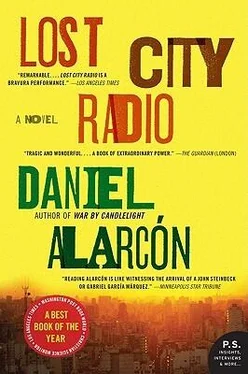“I warned you!” she screamed. “Murderers! Killers! Thieves!”
The soldiers fired shots in the air to disperse the gathered crowd. Idorú was that kind of neighborhood: where everyone spied on everyone else, where police were not welcome. Because his hands were cuffed, he couldn’t wave good-bye, but with great effort, Trini did manage a nod to his family — his brother, his nephew — before he was pushed into the back of an army truck.
WHEN REY disappeared, Norma returned to that night in Tamoé, that night when the war became real. It shook her, it fed her nightmares. She imagined it had been Rey bound to that chair all along; that all the years they had spent together were a lie, that her husband had always been imprisoned by the war. The accusations that he had been IL were, for Norma, irrelevant; the war had long ago ceased to be a conflict between distinct antagonists. The IL blew up a bank or a police station; the army ran its tanks over a dozen homes in the dark of night. In either case, people died. Rey went off to the jungle, the IL made its last stand in Tamoé and lost. Most of the district was razed. Then the killing flared and burned out in the jungle, and then it was over. Just like that, the lights came on. And where was Rey? The war had been for many years a single, implacably violent entity. And it had swallowed him. An engine, a machine, and the men with guns — they were simply its factotums. When enough of them died, it was finished.
That night of the fire, the long bus ride back to the station gave her time to consider her options. Norma felt an animal fear churning in her gut, and suspected she wasn’t cut out for journalism. Perhaps she could leave the country, board a plane bound for Europe, and become a nanny, a surrogate mother to a gaggle of wealthy children. She could learn a new language — and seeing the world, wasn’t that her right? She was twenty-eight, too old to go back to the university and pursue some other profession. It was too late to do what her father had always asked of her: learn secretarial skills and marry an executive, a man with a driver and a house bunkered somewhere in the hills where problems would not intrude. She had married Rey. He studied plants and was not an executive. He went off into the forest for weeks at a time. They had survived the tadek episode, but she knew enough to recognize that with Rey, problems would always intrude.
So lost in thought was Norma that she didn’t notice the soldiers lining the sidewalks in front of government buildings, or the driver pushing the bus faster and faster through the streets, or the unusually light traffic. It was late when Norma arrived, nearly ten, but the station was busy. She turned in her unused tape recorder, put her untouched notepad in the file cabinet, and was prepared, had she been asked, to resign. She felt sick with shame, with fear, but no one seemed to notice her. Norma shared a desk with another reporter, a pudgy-faced young man named Elmer. He worked long hours, even sleeping at the station some nights, and so, she wasn’t surprised to find him at the desk, rubbing his temples and looking happily beleaguered. A green pen poked out from between his teeth. He gave her a smile and said, “This world is going to shit.”
Norma didn’t know what to say. Elmer took the green pen from his mouth and twirled it between his fingers. He passed her the text he was working on. “Assassinations,” he said. “A half dozen all over the city. All the same, Norma, my dear. Men burned in their own homes.”
Norma sank heavily into her chair. “Where?”
“Venice, Monument, The Metropole. A few in Collectors. One in Ciencin and one in Tamoé. Weren’t you there?”
A phone rang at the next desk. Norma nodded. “I didn’t see anything,” she said. “It was already over when I showed up.”
“Didn’t you get anything?”
“There was a woman. She was selling juice.”
The phone kept ringing.
Elmer gave her an incredulous look, but Norma didn’t turn away. Something in him alarmed her. He was red-faced and excitable, too young for the deep creases on his forehead. He would be old soon. He was a mama’s boy, and he would grow wings before striking another man in anger, but on this night, this splendidly violent city night, he was enjoying himself.
“What?” Elmer asked.
How perverse: this adrenaline, these dead men.
“It’s awful.”
Elmer nodded and said, “It is,” but he couldn’t mean it. She was sure of that: he said the words, but they meant something altogether different when he did. He was a voyeur. He wanted to see how bad things could get. If pressed, it was something he might admit. Perhaps he was even proud of it.
“Rey called for you.”
Norma looked up. “He’s back?”
Elmer handed her a note where he had scrawled the name of a bar not far from the station. “But you should stay, Norma. Tonight, you should stay.”
“Tell them I was sick.” The phone had stopped ringing. She stood to go. “Please.”
It wasn’t a long walk to the bar, but the empty streets made it seem so. She saw only one person on her way: a hunchbacked old man pushing a shopping cart piled high with clothes down the middle of an alley. There was scarcely any traffic, and the air was still. Winter had ended, spring hadn’t yet come. Norma liked this time of year, this time of night. Why weren’t more people out to enjoy it? A streetlight flickered, dimmed, then glowed brightly. She was alone in the city, and she knew, however vaguely, that something terrible had happened. In fact, many terrible things had happened all at once. She heard the clink of the juice-cart bell, still echoing blithely in her mind. She never saw the dead man: how could she be sure he was real? As long as she didn’t know, there was an innocence to the evening, and it didn’t seem forced to her. It seemed sane.
The bar was quiet. The radio was on, and everyone listened. Norma scanned the room for Rey and found him, sharing a corner table with a few men she didn’t recognize. No one seemed to be looking at anyone else; instead, they watched the radio, a dented and scuffed black box sitting atop the refrigerator. A red-haired man chewed his fingernails. An olive-skinned woman with braided hair sat at the bar, tapping her foot nervously. There was an air of worry throughout the bar, and the waiters moved through the crowd with the grace and silence of mimes. The announcer was describing the evening’s events: dozens of dead, a shootout in the Monument district, sections of Regent Park on fire. Armed gangs had taken to the streets: there were reports of looting downtown, and burning cars in Collectors. The city was under attack. The president would be speaking soon.
Normally, the people would have jeered at the mention of the man, but on this night, there was no response.
Was it so long ago that the IL had been a joke? A straw man?
“Rey,” Norma said across the silent room. He saw her and held his finger to his lips. He got up and wove through the chastened, hushed drinkers to where she stood by the door. He looked tired and sunburned. He took Norma by the arm and pulled her out into the street. There, beneath the washed-out light of a street lamp, Rey kissed her.
“What a way to come home, no?”
“Let me see you,” Norma said, but it was dark, and she couldn’t make out the details of him.
He’d arrived at the train station just after the first fire, at four in the afternoon, around the time she’d been leaving the station for Tamoé. The buses had stopped running from the station, and so Rey had walked three hours, until he was tired of carrying his bag. He’d been stopped twice at checkpoints. Then, when he felt his legs were about to give out, he found himself in front of this bar, realized he was near the radio, and decided it was best to stay put.
Читать дальше












